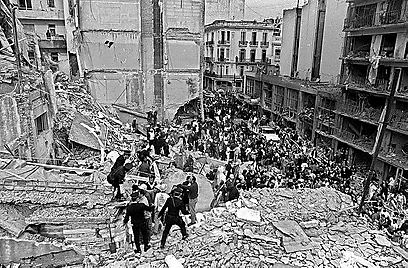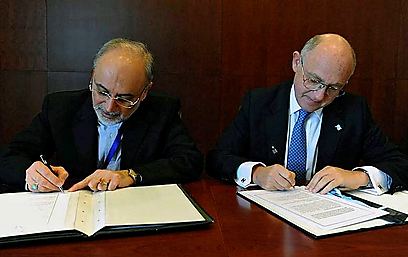The attorney general in the case, Alberto Nisman, said the agreement constitutes an "undue interference of the executive branch in the exclusive sphere of the judiciary."
Related stories:
- Argentine Jews demand justice from Iran in bombing
- Argentina offered to 'forget' bombings for improved ties
- Argentine prosecutor: Iran infiltrating continent
The van bombing of the building of the Argentine Jewish Charities Federation, or AMIA, left 85 people dead and 300 others injured in the worst attack of its kind in the South American country.
Argentina charges that Hezbollah, the Lebanese Shiite movement, carried out the attack under orders from Iran. Tehran's clerical regime denies the charges.
Since 2006, Argentine courts have demanded the extradition of eight Iranians, including former president Akbar Hashemi Rafsanjani, former defense minister Ahmad Vahidi and Mohsen Rabbani, Iran's former cultural attaché in Buenos Aires.
In 2007, Argentine authorities secured Interpol arrest warrants for five Iranians and a Lebanese in the bombing of the AMIA Jewish community center. In February, Argentina's congress approved, at the request of the executive branch, an agreement with Tehran to form a “truth commission” to investigate the bombing, consisting of five members who don't come from either Argentina or Iran.
Scene of 1994 bombing (Photo: AFP)
It also authorized an Argentine judge to travel to Iran to question former officials accused of involvement. Iran finally confirmed in September it had approved the deal, after several demands from Argentina.
But the two sides have still not named the members of the investigative commission, and there has been no agreement on a date for Argentine investigators to travel to Iran to interview suspects.
Leaders of Argentina's Jewish community, which at 300,000 people is the largest in Latin America, have criticized the “truth commission,” saying it was a diplomatic win for Tehran, while offering no benefit to Argentina.
Nisman's appeal noted that should the probe go forward, it could result in sanctions for Argentina from international human rights bodies. The agreed upon commission violates rights protected by Argentina's constitution including judicial independence, the guarantee of due process, the right to effective judicial protection and the right to justice for victims, his motion said.
Argentina FM Hector Timerman (R), Iran FM Ali Akbar Salehi sign MOU (Photo: AFP)
The 1994 bombing came two years after a group linked to Iran and the Lebanese militant group Hezbollah claimed responsibility for a bomb attack on the Israeli embassy in the Argentine capital, which killed 29. Tehran has denied links to either attack.
Argentina's President Cristina Fernandez is allied with left-leaning leaders who have been on good terms with Tehran, such as Venezuelan President Nicolas Maduro.
Currently, Iran is at the center of a storm of global drama: Led by the United States, the West has imposed sanctions on the regime – including targeting its key oil revenues – to force it into a diplomatic solution over its nuclear program, which Western nations believe is aimed at developing a nuclear bomb.
Reuters contributed to this report
- Receive Ynetnews updates
directly to your desktop

















